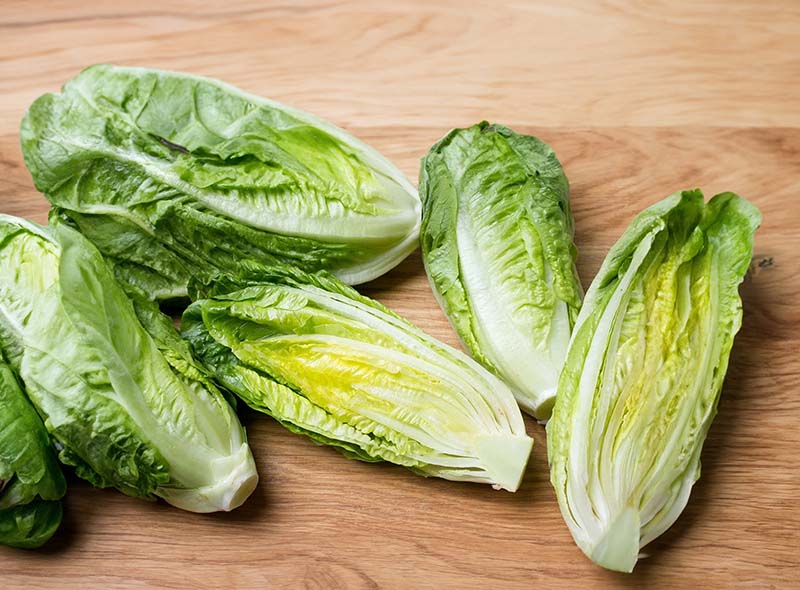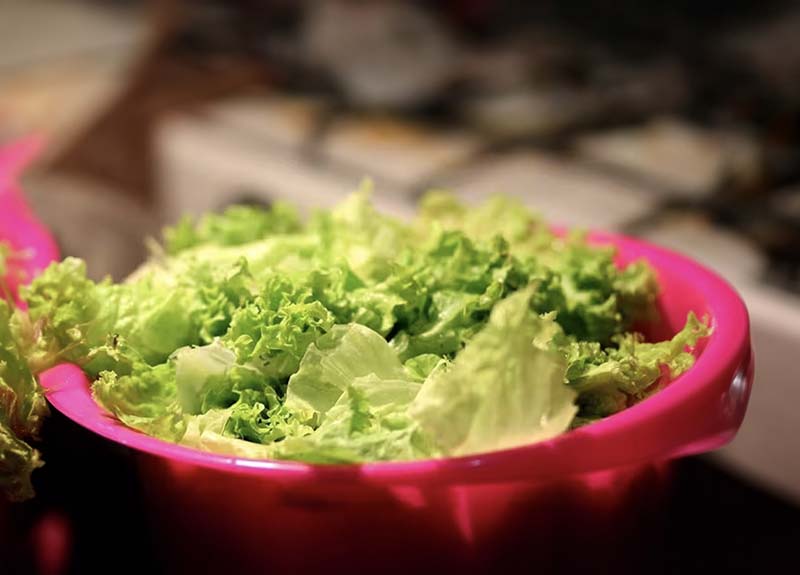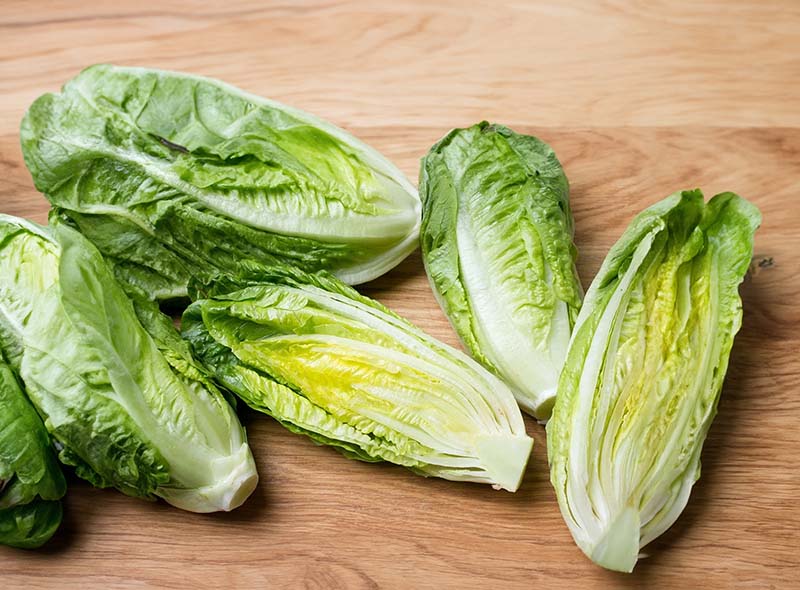Lettuce, a staple in salads globally, is more than just a leafy green; it’s a valuable ally in the quest for weight loss.
This article will delve into the heart of the question, “Is Lettuce Good for Weight Loss?” as we explore the numerous surprising benefits and facts about lettuce, revealing its role in a healthy lifestyle.
Related articles
- Are Lentils Good for Weight Loss: Health Benefits.
- Can Avocado Help You Lose Weight? Unveiling the Truth.
- White Kidney Beans for Weight Loss: Effortless Diet Boost.

Is Lettuce Good for Weight Loss?
Lettuce stands out as a remarkable choice for those mindful of their calorie intake, not just for its low calorie count but also for its ability to prevent overeating. Its high nutritional value comes from a wealth of essential minerals and vitamins it contains. Remarkably, lettuce is free from fat and cholesterol and maintains a low carbohydrate profile. This makes it an excellent option for anyone monitoring their dietary intake closely.
Another key benefit of lettuce is its role in regulating blood sugar levels, a crucial aspect for maintaining overall health. The high water content and dietary fiber in lettuce contribute to a lasting feeling of fullness. This property of lettuce is especially beneficial for those looking to manage their weight, as it reduces the temptation to snack between meals.
Incorporating lettuce into your weight loss plan is not only effective but also versatile. Lettuce recipes can easily be paired with other low-calorie foods. The crispy leaves of lettuce not only add a delightful texture but are also delicious, making them a joy to include in various meals.
Notes:
- Try using lettuce in creative ways, like in smoothies or as a wrap for sandwiches and burgers, to keep your meals interesting and varied.
- Opt for darker varieties of lettuce, such as romaine or red leaf, as they tend to have higher nutrient content compared to iceberg lettuce.
- Remember, while lettuce is beneficial, a balanced diet should include a variety of vegetables to ensure a wide range of nutrients.

Nutritional Facts of Lettuce
Lettuce is a powerhouse of nutrients, each contributing to various health benefits:
- Vitamin C: This vital nutrient boosts the immune system, is abundant in antioxidants, and plays a crucial role in maintaining the strength of bones and teeth.
- Calcium: Essential for building and maintaining strong bones, calcium also supports muscle and nerve functions, as well as blood clotting processes.
- Vitamin K: Working in concert with calcium, Vitamin K is key to blood clotting. It also plays a significant role in preventing bone mineral loss and reducing the risk of fractures, particularly those related to osteoporosis.
- Vitamin A (from beta carotene): An indispensable nutrient, Vitamin A, an antioxidant, is crucial for cell growth and reproductive health. It also supports vital organs like the heart, kidneys, and lungs, and is particularly important for eye health.
- Folate: As a B vitamin, folate is integral to cell division, DNA production, and the formation of genetic material. Its adequate intake is especially crucial for pregnant women to prevent issues like premature birth, low birth weight, and neural tube defects like spina bifida.
- Phosphorus: This mineral works synergistically with calcium to fortify bones and teeth.
- Magnesium: It aids enzyme functions and muscle relaxation. Magnesium collaborates with calcium in tissue building.
- Potassium: An essential electrolyte, potassium ensures regular heartbeats, supports nerve function, and aids muscle contraction. It also helps cells utilize nutrients effectively and mitigates the adverse effects of sodium on the body.

Benefits of Lettuce for Weight Loss
Lettuce is a remarkable vegetable that offers a multitude of health benefits, making it an excellent choice for anyone looking to improve their overall well-being and support weight loss efforts.
Enhances Metabolism
Adequate metabolism is crucial for our body to convert food into energy effectively. Lettuce, rich in iron, magnesium, and potassium, plays a significant role in improving our body’s metabolic processes. Additionally, the presence of Vitamin B-complex in lettuce aids in enhancing metabolic functions, ensuring that our body efficiently utilizes the energy from the food we consume.
Low in Calories
With only 2-3 grams of carbohydrates per 100 grams, lettuce is an exceptionally low-calorie option. It serves as a perfect substitute for high-calorie foods like tortilla wraps, bread loaves, and burger buns, which are higher in carbohydrates and calories. This substitution is especially beneficial for those looking to reduce their calorie intake without sacrificing satisfaction.
Facilitates Burning of Belly Fat
Incorporating lettuce and other leafy greens, such as kale, into your daily meals can significantly aid in weight loss, including the reduction of belly fat. By replacing one meal a day with these greens, you not only cut down on calorie intake but also actively contribute to burning stubborn belly fat.
Prevents Overeating
Lettuce’s high water content, approximately 96%, is a key factor in its ability to create a feeling of fullness and satiety while contributing minimal calories. This feature can lead to a reduced overall calorie intake, as studies have shown that consuming foods with high water content enhances the sense of fullness, thereby preventing overeating.
Highly Nutritious
The nutritional profile of lettuce is impressive, making it a staple in many diet plans. It is an excellent source of beta carotene (vitamin A), necessary for healthy skin, bones, and eyesight. Additionally, lettuce provides a fair amount of folate, vital for cell health and crucial for the healthy development of babies during pregnancy to prevent neural tube defects. Folate also plays a role in the production of healthy blood cells, preventing fatigue.
Additional Health Benefits of Lettuce
Lettuce, beyond its crisp texture and refreshing flavor, brings a host of health benefits to the table. Its roles in enhancing immunity, regulating sugar levels, and even cancer prevention are among the many reasons it’s highly valued in nutrition.

Detoxifies The Body
Our body’s metabolism creates toxins like free radicals and urea, which can be harmful if not eliminated. Lettuce plays a crucial role in this detoxification process. The minerals found in lettuce assist in purging these toxins and help maintain a healthy acid-base balance in the body.
Acts As an Antioxidant
Lettuce, a key component of the Mediterranean diet, is celebrated for its high antioxidant content. However, not all lettuce varieties offer the same level of antioxidants. Green leaf lettuce varieties provide antioxidants that work at a more gradual pace, while red-leaf lettuce varieties exhibit quicker antioxidant effects.
Supports Brain Development
Regular consumption of lettuce may contribute to brain health. Its antioxidant and anti-degenerative properties, attributed to phenolic compounds, can potentially protect the brain from ischemic damage (caused by low blood oxygen levels) and aid in recovery from reperfusion injury.
Exhibits Anxiolytic Properties
Lettuce possesses anxiolytic properties, which can help alleviate anxiety and manage mental health disorders.
Aids in Clotting
Rich in Vitamin K, lettuce is crucial for the synthesis of proteins needed for blood clotting.
Possesses Anti-microbial Properties
Lettuce’s antimicrobial characteristics stem from its content of terpenes and cardenolides, which help combat pathogenic microbes that cause various ailments. Additionally, lettuce enhances immunity, further supporting the body’s ability to fight off harmful germs.
Displays Anti-inflammatory Effects
High in vitamins A, C, and K, lettuce possesses anti-inflammatory properties. It’s often used in herbal medicine to treat inflammation and provide pain relief.
Boosts Immunity
Lettuce is rich in vitamins and phytochemicals, with Vitamin C and other phytochemicals potentially playing a role in activating and boosting immunity.
Contributes to Bone Health
Lettuce aids in improving bone health. Vitamin A is vital for cell development, and vitamin K is essential for forming collagen meshwork, which strengthens tissue. Vitamin C in lettuce is key for preventing bone depletion and is particularly important for women at risk of osteoporosis.
Exhibits Anti-cancer Properties
Lettuce can play a significant role in cancer prevention and treatment. Its fiber, vitamins, minerals, and antioxidants contribute to overall health and may help reduce the risk of cancer. However, it’s important to consult healthcare professionals before making any significant dietary changes for cancer prevention or treatment.
Regulates Sugar Levels
Being a low-glycemic index food, lettuce minimally impacts blood sugar levels and is recommended for those managing their blood sugar.
Provides Hepatoprotective Effects
Lettuce extracts have shown hepatoprotective properties, potentially preventing liver damage caused by substances like paracetamol. These extracts may also be beneficial in treating diseases caused by free radical damage.
Side Effects and Additional Considerations
While lettuce is generally great for health, there are a few things to keep in mind before adding a lot of it to your diet.

Interaction Between Vitamin K and Warfarin
Eating too much lettuce can be an issue for some people, especially those on blood-thinning medications like warfarin. Lettuce has a lot of Vitamin K, which is important for blood clotting. But, if you’re taking a blood thinner, too much Vitamin K can make your medicine less effective. It’s always best to talk to your doctor before eating a lot of foods high in Vitamin K when you’re on these medications.
Presence of Anti-nutrients
Lettuce contains some natural compounds called anti-nutrients, like nitrates, phytates, tannins, oxalates, and cyanogenic glycosides. These are usually fine in small amounts, but eating a lot of them can cause problems. For example, too many nitrates might be harmful, especially for babies, and could lead to some health risks like cancer or birth defects.
Conclusion
In addressing “Is Lettuce Good for Weight Loss?”, it’s clear that lettuce is a valuable part of weight management and a healthy lifestyle. With its low calories and rich nutrients, lettuce is ideal for those aiming to lose weight.
Remember, though, to consider dietary needs and medication interactions. We invite you to share your lettuce-related weight loss stories at HealthConnect, and to explore more health topics with us. Your journey to better health matters, and we’re here to support you.

Dr. Joyce Slater: Your Guide to Informed Health Choices
Dr. Joyce Slater shines as a distinguished expert in the field of nutrition and public health. Contributing her vast expertise to HealthConnectbc, she embodies a deep-seated passion for enhancing public well-being. As a respected figure in her field. Dr. Slater’s academic journey and professional achievements are nothing short of inspirational.
Holding a significant position as a researcher and educator, Dr. Slater has delved deeply into the intricacies of food literacy and nutritional science. Her work, prominently featured in numerous esteemed scientific publications, underscores her dedication to expanding our understanding of food’s role in health and society.
At the heart of Dr. Slater’s professional ethos is a profound desire to positively impact individual lives through education and research. She often says, “Empowering people with the knowledge to make healthier choices is the most rewarding aspect of my work.” This principle is the cornerstone of her involvement with HealthConnectbc, where she strives to provide reliable and practical health advice.
Dr. Slater’s contributions to HealthConnectbc are multifaceted: academically, she offers insights into the complex world of nutrition and health, enhancing both public understanding and professional practices. Additionally, she is instrumental in guiding and inspiring the next generation of health professionals, thus fostering future excellence in the field.
Juggling rigorous research with her educational duties, Dr. Slater demonstrates an unwavering commitment to her profession. Her approachable nature and genuine concern transcend the confines of academia, touching the lives of everyone she interacts with. Dr. Slater looks forward to continuing her journey of discovery and education, dedicated to the ongoing improvement of public health and nutrition.
At HealthConnectbc, Dr. J. Slater is not just a contributor; she is a guiding light, dedicated to enlightening and motivating individuals towards a healthier and more informed lifestyle.
PUBLISHED ARTICLES
- Food literacy competencies: A conceptual framework for youth transitioning to adulthood (2018)
- Self-perceived eating habits and food skills of Canadians (2016)
- Challenges to acquiring and utilizing food literacy: Perceptions of young Canadian adults (2016)
- Socio-demographic and geographic analysis of overweight and obesity in Canadian adults (2009)
- Sustainable well-being: Concepts, issues, and educational practices (2014)

